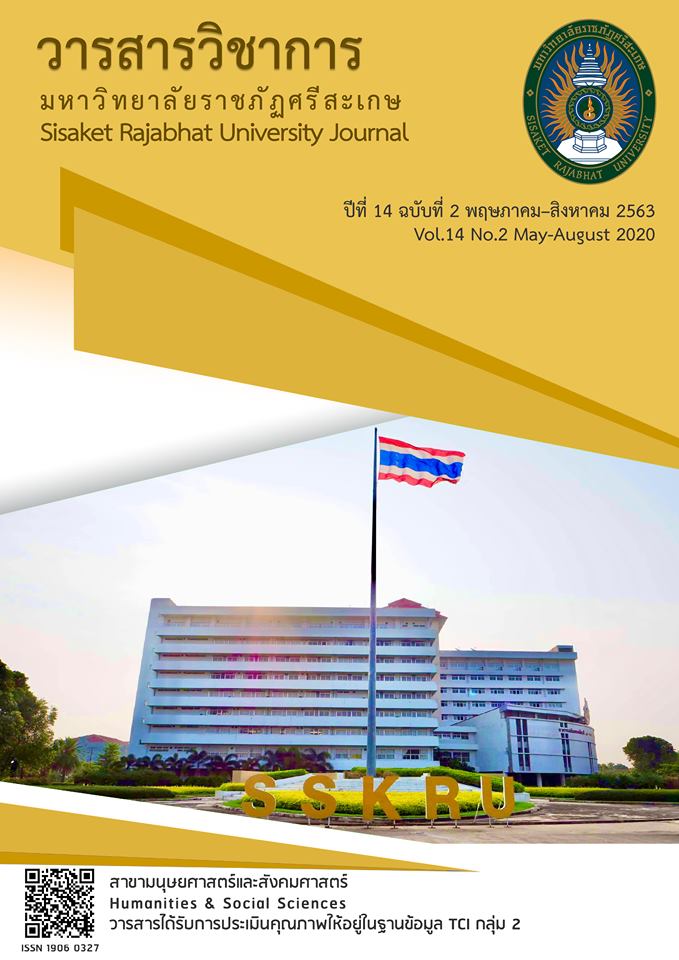The Effect of Tax Planning of Non-capital market companies on Earnings Management in Thailand
Main Article Content
Abstract
The objective of this study is to the effect of tax planning on earnings management of non-capital market companies in Thailand.The samples comprise of public limited companies with the top 100 in the Department of Business Development (DBD), which divided according to income, assets, profit and capital. The data was collected from the financial statements during period 2016 to 2018. The samples comprise of 414 firm-years. Research hypotheses were tested by multiple regression analysis. Tax planning was measured by effective tax rate (ETR) and the ratio of tax to total assets (TAX/ASSET). Earnings management was calculated by Modified Jones Model (1991). Overall, the result show that the tax planning had positive impacts on the earnings management. Because Thailand, the relationship between accounting principles and tax principles is interrelated Causing executives to have a impulsion in earnings management. However companies listed on the Stock Exchange of Thailand (SET) have higher tax planning and earnings management than companies non-listed on the Stock Exchange of Thailand (NON-SET). In addition, the research results are expected to provide additional information on investment decisions for investors regarding financial information from a tax planning perspective.
Article Details
1. เนื้อหาและข้อมูลในบทความที่ลงตีพิมพ์ในวารสารวิชาการมหาวิทยาลัยราชภัฏศรีสะเกษ ถือเป็นข้อคิดเห็นและความรับผิดชอบของผู้เขียนบทความโดยตรง ซึ่งกองบรรณาธิการวารสาร ไม่จำเป็นต้องเห็นด้วย หรือร่วมรับผิดชอบใด ๆ
2. บทความ ข้อมูล เนื้อหา รูปภาพ ฯลฯ ที่ได้รับการตีพิมพ์ในวารสารวิชาการมหาวิทยาลัยราชภัฏศรีสะเกษ กองบรรณาธิการไม่สงวนสิทธิ์ในการคัดลอกบทความเพื่อการศึกษา แต่ให้อ้างอิงแหล่งที่มาให้ครบถ้วนสมบูรณ์
References
and Tax Considerations: A Conceptual Analysis. International Journal of
Business Management and Commerce., 3(2), 25-35. [In Thai]
Baideen, O. (2015). The Relationship Ownership Shareholder Board Composition
and Corporate Social Responsibility Disclosures : A Case Study of Listed
Companies in The Stock Exchange of Thailand (SET).
Songkla University, Songkla University. [In Thai]
Chen, K. Y., Elder, R. J., & Hung, S. (2010). The investment opportunity set and earnings
management: Evidence from the role of controlling shareholders.
Corporate Governance: An International Review, 18(3), 193-211.
Gaertner, F. B. (2014). CEO after-tax compensation incentives and corporate tax
avoidance. Contemporary Accounting Research, 31(4), 1077-1102.
Hair, J. F., Black, W. C., Babin, B. J. & Anderson, R. E. (2010). Multivariate data analysis.
Pearson Education, New Jersey.
Hassan, S.U., & Bello, A. (2013). Firm Characteristics and financial reporting quality of
listed manufacturing firms in Nigeria. International Journal of Accounting,
Banking and Management, 1(6), 47-63.
Ifada, L. M. & Wulandari, N. (2015). The Effect Of Deferred Tax And Tax Planning Toward
Earnings Management Practice (Empirical Study on Non Manufacturing
Companies Listed in Indonesia Stock Exchange in the period of 2008-2012).
International Journal of Organizational Innovation, 8(1).
Jones, J. J. (1991). Earnings management during import relief investigations. Journal of
accounting research, 29(2), 193-228.
Lanis, R., & Richardson, G. (2011). The effect of board of director composition on
corporate tax aggressiveness. Journal of Accounting and Public Policy,
30(1), 50-70.
Marques, M., Rodrigues, L. L. & Craig, R. (2011). Earnings management induced by tax
planning: The case of Portuguese private firms. Journal of International
Accounting, Auditing and Taxation, 20(2), 83-96.
Mulyadi, M. S., & Anwar, Y. (2015). Corporate governance, earnings management and tax
management. Procedia-Social and Behavioral Sciences, 177, 363-366.
Naz, I., Bhatti, K., Ghafoor, A., & Husein, H. (2011). Impact of firm size and capital
structure on earnings management: Evidence from Pakistan. International
Journal of Contemporary Business Studies, 2(12), 22-31.
Prommala, W. (2016). Relationship Between Earnings Management and Executive
Compensation of Listed Companies in the Stock Exchange of Thailand.
Chiang Mai University, Chiang Mai. [In Thai]
Tantiyavarong, T. (2009). A Study of the Determinants of Tax Planning and the
Association between Tax Planning and Firm Value: An Empirical Evidence
of Thailand. Chulalongkorn University, Bangkok. [In Thai]
Wang, S. & Chen, S. (2012). The motivation for tax avoidance in earnings management.
Scientific Research, 447-450.
Warsono. (2017). Deferred Tax Assets and Deferred Tax Expense Against Tax Planning
Profit Management. Shirkah Journal of Economics and Business,
2(2), 199-214.
Watts, R. L., & Zimmerman, J. L. (1990). Positive accounting theory: a ten year
perspective. Accounting review, 131-156.
Young, M. R. (2002). Accounting Irregularities & Financial Fraud. Aspen law & business.


